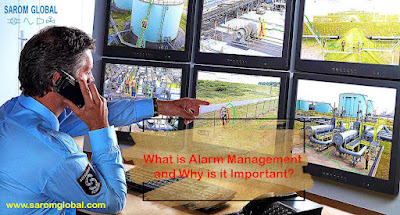Best Practices in Alarm Management
Alarm management is an essential component of industrial operations, ensuring that alarm systems are effectively configured, monitored, and analysed to maintain safety and efficiency. Proper alarm management aims to reduce alarm fatigue, ensure prompt alarm response, and enhance overall operational reliability.
This comprehensive approach helps prevent incidents and optimise industrial processes by addressing critical alerts promptly and appropriately.
Establishing Alarm Management Policies and Procedures
Developing comprehensive alarm management policies and procedures is fundamental to effective alarm handling. These policies should articulate the criteria for alarm prioritization, alarm response, and alarm configuration. Clear procedures ensure standardised alarm handling across the organisation, promoting consistent and effective responses to alarms. Policies should outline roles and responsibilities, response actions, and escalation procedures. Regular review and updating of these policies are essential to adapt to changing operational needs and technological advancements.
Prioritizing and Categorizing Alarms
Effective alarm management necessitates the prioritization and categorization of alarms based on their urgency and potential impact on operations. Alarm prioritization ensures that critical alarms receive immediate attention, while lower-priority alarms are managed appropriately. Categorizing alarms into different levels (e.g., critical, warning, informational) helps streamline alarm response and prevents alarm fatigue by reducing the number of non-essential alerts. This approach ensures that operators can focus on the most significant alarms, improving their ability to manage critical situations effectively.
Strategies for Reducing Alarm Overload
Alarm overload occurs when operators are overwhelmed by too many alarms, leading to alarm fatigue and potential oversight of critical issues. Implementing strategies such as alarm rationalization—which involves reviewing and optimising the alarm system configuration—can significantly reduce alarm overload. This process includes evaluating the necessity of each alarm, adjusting thresholds, and eliminating redundant or unnecessary alarms. By focusing on meaningful and actionable alarms, alarm rationalization enhances operator effectiveness and reduces the cognitive load on operators.
Techniques for Alarm Rationalization
Alarm rationalization involves a systematic review and adjustment of alarm settings to align with operational needs. This process includes assessing alarm thresholds, deadbands, and delays to minimise nuisance alarms. Techniques for alarm rationalization involve cross-functional teams conducting workshops to evaluate each alarm's purpose and necessity. Alarm analysis tools can help identify patterns and trends, indicating areas for improvement in alarm configuration. Effective alarm rationalization results in a more streamlined and relevant alarm system, improving clarity and reducing unnecessary disruptions.
Training and Education for Effective Alarm Management
Training and education are vital for ensuring that personnel can effectively manage and respond to alarms. Regular training sessions should cover alarm handling procedures, the importance of alarm monitoring, and techniques for effective alarm response. Training should also address the psychological aspects of alarm fatigue and strategies to mitigate it. Continuous education helps maintain a high level of competency and awareness among operators, reducing the risk of errors and improving overall alarm management performance. Practical drills and simulations can reinforce theoretical knowledge, ensuring operators are well-prepared for real-world scenarios.
Monitoring and Reviewing Alarm System Performance
Continuous alarm monitoring and periodic review of the alarm system are essential for maintaining optimal performance. Alarm performance metrics, such as alarm frequency, response times, and operator actions, should be tracked and analysed regularly. This alarm reporting helps identify areas for improvement and ensures that the alarm system remains effective and reliable. By analysing trends and performance data, organisations can make informed decisions to enhance their alarm management practices. Regular audits and reviews ensure that the alarm system adapts to changing operational conditions and remains aligned with best practices.
Integrating Alarm Management with Other Safety Systems
Integrating alarm management with other safety systems enhances overall operational safety and efficiency. Coordination between alarm systems and systems like process control, emergency shutdown, and fire detection ensures a holistic approach to safety management. Integration enables comprehensive incident management, allowing for a coordinated response to emergencies.
For instance, an alarm indicating a hazardous gas leak should trigger not only operator alerts but also automatic shutdown procedures and notifications to emergency response teams. This integrated approach ensures that all safety mechanisms work together seamlessly to protect personnel and assets.
Ensuring Compliance with Industry Standards and Regulations
Compliance with industry standards and regulations is crucial for effective alarm management. Industrial standards provide guidelines for designing, implementing, and maintaining alarm systems. Adhering to these standards ensures that the alarm system meets best practices, and regulatory requirements, and enhances overall safety and performance. Regular audits and assessments help ensure ongoing compliance, and any gaps identified should be addressed promptly. Staying up-to-date with regulatory changes and industry advancements is essential to maintaining a compliant and effective alarm management system.
Conclusion
Implementing best practices in alarm management is essential for maintaining safety, efficiency, and compliance in industrial operations. By establishing clear policies, prioritizing and categorizing alarms, and adopting strategies to reduce alarm overload, organisations can enhance their alarm handling capabilities. Ongoing training, continuous alarm monitoring, and integration with other safety systems further strengthen alarm management processes. Adhering to industry standards ensures that alarm systems are designed and maintained to the highest standards, promoting a safe and efficient operational environment. Effective alarm management ultimately leads to improved safety, operational reliability, and regulatory compliance.
By embracing these best practices, industries can mitigate risks, protect assets, and uphold their commitment to safety and operational excellence. Through continuous improvement and adaptation to emerging technologies and standards, organisations can ensure their alarm systems remain robust and effective, fostering a culture of safety and reliability in industrial operations.




Comments
Post a Comment